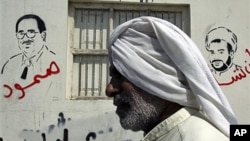A security court in the Gulf state of Bahrain has sentenced 20 doctors and medics to long jail sentences for treating wounded demonstrators during unrest earlier this year. The court sentence is expected to further enrage the kingdom's restive Shi'ite majority, which has been protesting the rule of the country's minority Sunni leadership.
The security court in Bahrain sentenced medical workers to jail time ranging from five years to 15 years in prison. The state-run Bahrain News Agency said the medics were jailed for forcefully occupying a hospital, spreading false news, inciting hatred of Bahrain's rulers and calling for an overthrow of the regime.
|
VOA's Susan Yackee speaks with Said Boumedouha of Amnesty International about the sentencing: |
The ruling comes a day after a court upheld life sentences for eight Shi'ite opposition activists convicted of plotting to overthrow the Sunni-led minority government. Thirteen other activists received sentences ranging from two years to 15 years on similar charges of sedition.
Bahraini officials say that the sentences can be appealed. But they are provoking an outcry from the country's Shi'ite opposition.
A crowd of several hundred Shi'ite protesters carrying flags and banners shouted slogans against Bahrain's rulers. Amnesty International's Said Boumedouha condemned the harsh sentences against the doctors.
“These trials are grossly unfair," said Boumedouha. "Some of the defendants in this trial and other trials have been tortured and they were forced into making confessions and so many people were detained without judicial arrest warrants. And, it's a military court. Civilians should not be tried before a military court.”
Khattar Abou Diab, who teaches political science at the University of Paris, argues that the latest turn of events in Bahrain indicates an unwavering government policy.
He says that despite the pleas of King Hamid and his son, the crown prince, for a policy of reconciliation, a hardline faction inside the ruling family has gained sway against the more conciliatory line advocated by the king.
Thursday's tough sentences indicate that faction shows no signs of backing down.




